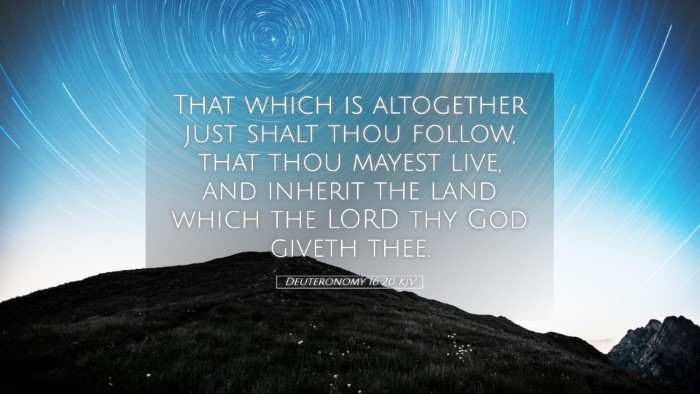Commentary on Deuteronomy 16:20
“You shall follow what is altogether just, that you may live and inherit the land which the Lord your God is giving you.”
Introduction
The verse from Deuteronomy 16:20 encapsulates a key principle of justice that is foundational to the Mosaic Law. It underscores the importance of righteousness and fairness in the judicial decisions of the Israelites, reflecting God's character and expectations for His people. This commentary aims to provide a comprehensive analysis by synthesizing insights from notable public domain biblical scholars such as Matthew Henry, Albert Barnes, and Adam Clarke.
Justice as a Command
This imperative to pursue justice is not merely a suggestion; it is a divine command integral to the covenant relationship between God and Israel. Justice becomes the pathway to life and the means to possess the land promised to them. As Matthew Henry notes, the injunction “follow what is altogether just” implies an active pursuit of fairness and integrity, ensuring that both moral and legal standards align with God's will.
Understanding Justice
Justice Defined:
-
Albert Barnes elaborates that justice involves not only legal fairness but also ethical conduct in personal relationships.
-
Adam Clarke emphasizes that true justice emanates from a heart aligned with God, influencing how laws are applied and how individuals treat one another.
Theological Implications
The requirement to pursue justice reflects God's own nature as a just and righteous deity. Henry explains that those who uphold justice echo the moral attributes of God Himself. The call to justice in this verse therefore serves multiple theological purposes:
- It signifies the covenantal relationship God establishes with Israel—one that demands obedience to His laws.
- The pursuit of justice is a means to demonstrate God's glory, as nations observe His people living in accordance with His statutes.
Contextual Insights
This verse appears within a broader discourse on the establishment of judicial systems among the Israelites. Barnes links this command to the preceding instructions about proper worship and the avoidance of idolatry, suggesting that just authorities are necessary for maintaining the community's integrity in faith.
Application for Believers
This call to justice extends beyond ancient Israel into the lives of modern believers. The principles embodied in Deuteronomy 16:20 challenge both individuals and communities to adopt just practices in every aspect of life, including societal structures, ecclesiastical governance, and personal conduct.
Clarke posits that a commitment to justice leads to spiritual and civic renewal. For pastors, understanding and preaching justice as rooted in God's nature fortifies their teaching, reminding congregants of their role in promoting equity in all realms of life.
Summary
In summary, Deuteronomy 16:20 emerges as a vital directive for the people of Israel and remains relevant today. It encapsulates the necessity of embodying justice—a reflection of God’s character—in all aspects of life. As spiritual leaders, scholars, and practitioners seek to apply these ancient commands to contemporary circumstances, they do so within the framework of grace—understanding that while our pursuit of justice is crucial, it is ultimately God's redemptive plan that upholds and fulfills the deepest intentions of the law.


